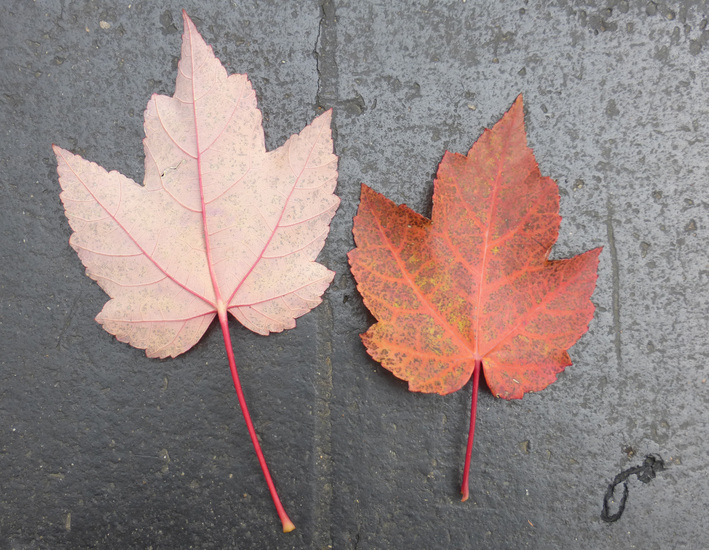Red Maple
(Acer rubrum L.)
Description
Also called swamp maple or soft maple, red maple is a member of the soapberry family (Sapindaceae, previously Aceraceae). It is a large tree that can grow to 125 feet, but typically 60-90 feet, and it can reach a maximum age of 150 years¹. The gray bark on young stems is smooth and rough, but not furrowed as on older stems. Its leaves are attached on opposite sides of the stem and have three main lobes and sometimes two smaller lobes. Leaves have doubly serrated (two sized teeth) margins and are green on the upper surface and typically whitish on the lower surface. The leaf petioles are often reddish. Leaves turn bright red in the fall. Male and female flowers are on the same plant or on separate plants and open before leaves develop in the early spring 9. Fruits are double samaras, 0.75 in long, that are shed in late spring or early summer.

Young stem of red maple. @ J. Brighton* 2012, Maryland Plant Atlas6

Lower (left) and upper leaf surfaces of red maple against gray bark. @ Z. Akulova, (CC BY-NC 3.0) 2015. CalPhotos²

Flowers of red maple. @ M. Beziat* 2019, Maryland Plant Atlas6

Samaras of red maple. @ G. Rembert, (CC BY 3.0) 2005. CalPhotos³
Distribution
Red maple grows from Newfoundland to southeastern Manitoba, south to East Texas and east to Florida¹. It grows over the widest range of habitat types of any species in North America¹. It can be found on dry ridge tops as well as in bottomlands and bogs¹. It is found throughout Maryland 6.
\ 
Native range of red maple. USGS 8
Wildlife importance
Red maple is one of the earliest nectar sources for bees in the early spring. Its seeds are consumed by numerous birds. Because of its wide tolerance for habitat, it is a frequently planted landscape tree. The the larvae of the Rosy Maple Moth 4 frequently feed on red maple.

Rosy Maple Moth. @ B. Cammarata* 2015. Maryland Biodiversity Project

Rosy Maple Moth. @ P. Coin (CC BY-NC-SA 4.0), iNaturalist 4
Economic Importance
Maple syrup can be produced from red maple, but the sap has a lower sugar content and must be collected prior to flowering or the flavor changes¹. The wood can be used for furniture, but is usually painted as the grain is not as attractive as other woods. Red maple makes an excellent tree for landscaping by flowering early in the spring and contributing bright red coloration in the fall 7.
Threats
Red maple is not greatly threatened by pests or disease, but is susceptible to fire damage. Its shorter life span leads to its replacement in forests by longer-lived and more shade tolerant species such as sugar maple and American beech.
Interesting Facts
- Red maple is the state tree of Rhode Island.
- The national champion red maple is in the Great Smokey Mountains National Park. It measured 142 feet tall and just over seven feet in diameter in 19975.
References
- USDA-Forest Service Silvics Vol. 2 Hardwoods: Acer rubrum
- CalPhotos: Acer rubrum
- CalPhotos: Acer rubrum fruits
- iNaturalist: Rosy Maple Moth
- Arbor Day Foundation: Red maple
- Maryland Plant Atlas: Red Maple
- North Carolina State Extension: Acer rubrum
- Wikimedia Commons: USDA: map for Acer rubrum
- University of Maine Cooperative Extension: Red maple
- Maryland Biodiversity Project: Rosy Maple Moth
Contributed by J. Hull
Towson University Glen Arboretum
